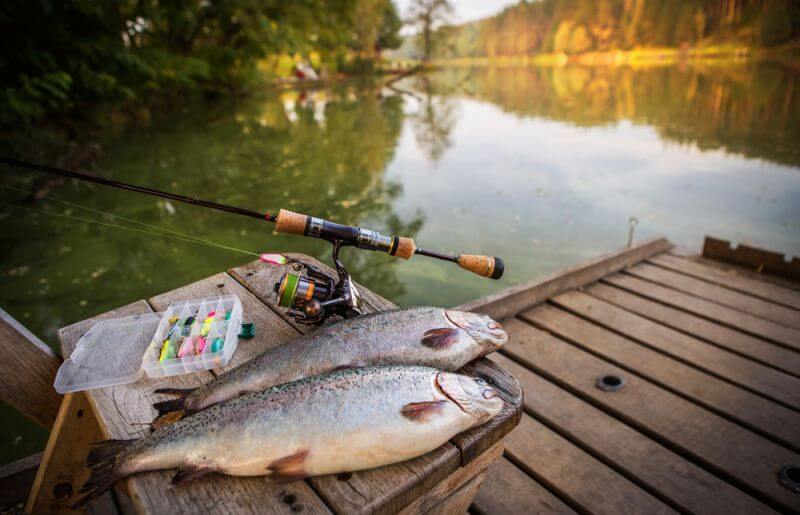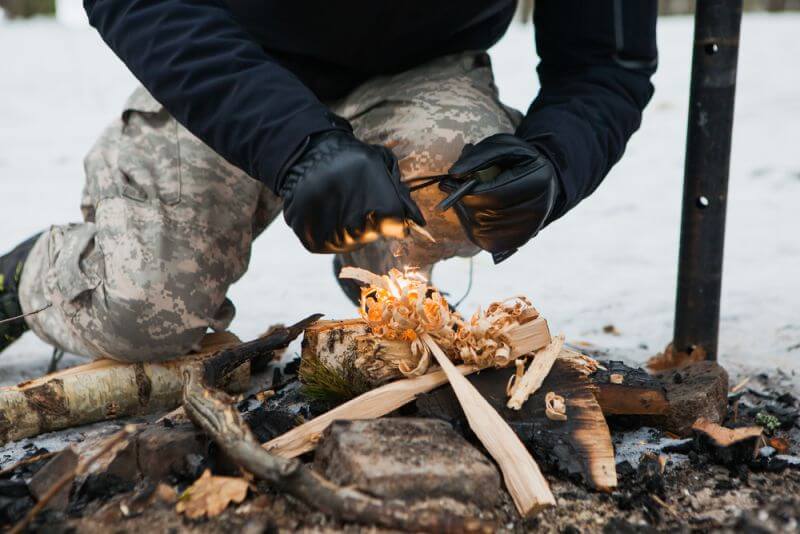Even before you notice the first signs of a weak economy, events associated with a major crash may already be in motion. Being able to navigate suddenly becoming homeless or a severe income loss may revolve around skills you can barter or trade in exchange for the necessities of life.
In particular, food production skills are essential if you decide to go to a rural area. While this article focuses on food production, preparation processes are also fundamental and will be covered in a future article.
Hunting and Fishing
Before people learned how to grow crops and domesticate animals, hunting and fishing were primary sources of food production. To this day, people in rural areas learn hunting and fishing from family members. They may proudly carry on customs that date back hundreds of years and span several continents. These customs cover everything from:
- How young people will be brought up
- Which types of game or fish to take during various seasons
- Local lure and legends about iconic animals and fish
- How different people in a hunting party work together to track animals
- For larger animals like bear, how the hunting party works together for safety of the group while killing the animal.
It is not possible to have this level of information and background as a new arrival from another rural area, let alone from a city. What you can do is gain fishing, and also hunting skills such as shooting, trapping, and bow hunting. You can take hunter certification classes and talk to the local game wardens about programs available in your area. This book on shooting techniques may also help improve your skill.
When you go to a rural area, make sure you take the time to find out how the local people carry out a hunt. If you can go with a family group, this will be to your advantage. Along with teaching you the local customs and best places to hunt, you will also have the beginnings of a good social place in the community.
Farming vs. Gardening
Just because you are good with houseplants or have a way with animals, that doesn’t mean you are ready to manage growing food on your homestead or work on a farm. There are many skills you will need to develop and practice as much as possible before the economy crashes.
Here are some ways farming differs from gardening:
Gardening is usually a personal hobby or occupation designed to provide some food support for one or more people. It is not something you do for profit. If you have enough land, you can provide for a significant portion of your nutritional needs.
Typically, a garden will have several different kinds of plants. When combined with a fish pond or small numbers of animals like chickens, the garden may supply most, if not all, of your nutritional needs.
Your equipment may be as simple as a hoe, rake, and shovel. Depending on your level of interest, you may save seeds from year to year, use organic gardening methods, and have your own composting system. This guide for a pocket farm is a bit more complex, but a good start.
By contrast, farms are highly specialized businesses that operate for a profit. They are designed to produce as much food as possible for many people using the smallest number of resources.
While many farms are monocropping enterprises, others may grow two or more crops. A significant difference exists between farms dedicated to animals, fish, and plants.
These days, farms also have all kinds of high-tech equipment to manage and maintain. Harvesting and soil management equipment may be run from a computer station, along with watering systems and schedulers for crop dusting. Farmers may also rely on dedicated software for financial management, product transport, marketing, and other needs.
Even a family-owned and operated farm may use far more technology than you would expect. Unless the farm is run by a religious group that doesn’t use modern technology, you can expect to see a lot of computers and other technology used in day-to-day operations.
Where to Get Information and Develop Skills
4H Clubs
The 4H Clubs are mainly for children, young adults, and adults interested in learning tangible farming skills. They have a range of skill levels available, from beginner to advanced.
For those individuals who use the 4H clubs to learn how to raise farm animals, the projects are usually done on a small scale with just a few animals. If mistakes happen, it will not be a significant loss that could shut down your small farm.
Local Cooperative Extension (USDA) Offices run by the United States Department of Agriculture.
These offices can provide young people and adults with the latest and most modern information on farming and gardening. The extension agents work with the communities through workshops, educational events, and personal appointments at the county, state, and federal levels to address specific community needs in agriculture.
Some other things you will learn:
- How to estimate the amount of land required for each animal or plant type
- Common diseases in plants and animals
- Which plants and animals will do best in specific regions
- How to manage harvesting and slaughter
Farm Internships and Apprenticeships
Depending on the locality offering the program, they may or may not provide information on high-tech topics or large farm equipment. To obtain this type of information, you may need to find a local farm willing to offer an apprenticeship. The latter may be receptive to working with you if you already have some background through 4H or a USDA program.
Formal Education
If you want a formal degree in farming, you must attend an agricultural college. In most cases, you must move to a rural area to attend in-person classes. Before that, you can review the course catalog and do your elective work through online colleges. Just make sure the college you attend for elective work has a dedicated transfer agreement into the agricultural college you wish to attend.
You can also pursue several other types of degrees that will make you valuable to farms, even if you don’t work with day-to-day operations in the field. In many cases, accredited online classes will enable you to complete most, if not all, of your degree studies.
Some additional degrees include:
- Computers and Information Technology – Try to find coursework in the intersection between machinery and computers. In these times, robotics and AI are also emerging technologies on farms that might make for a good career once you move to a rural area.
- Computer Security — One of the biggest unrecognized sectors is preventing computerized farm equipment and systems from getting hacked. As global threats heat up, you can rest assured that farms will feel the impact sooner or later when their equipment is targeted by a malicious actor. Being able to troubleshoot these issues may prove to be an essential skill in times of need.
- Farm equipment repair and maintenance – You may be able to set up your own business based on this degree and experience, work for a single large farm, or as a responder for the equipment manufacturer. Make sure that you know how to handle older, non-computerized equipment as well as newer models.
- Economic Trends, Investing, and Financing – These degrees might be useful if you are looking to move to a rural area where farms are looking to improve their farms or planning significant upgrades. You can also add some coursework in investing to use for creating your own investment portfolio.
- Genetics, Biodiversity, and Ecology—Modern farmers are constantly on the lookout for plants and animals that will be more resistant to disease and capable of producing nutritious food. Depending on the size of the farm, they may conduct field research on organisms developed by other companies. Degrees in this field can make it possible for you to get good jobs on farms and in farming-related research venues.
- Transport and Logistics – No matter whether the farm needs to bring in a range of chemicals or move products out to processors, the scheduling and equipment can be complicated. A degree in transport and related logistics may be beneficial.
Low-skilled Labor Opportunities
If President Trump is successful in ousting undocumented people from the United States, there are likely to be many low-skilled labor jobs on farms throughout the nation. Now is the time to make sure you are physically fit and have some idea about the kinds of labor you would expect to do on a farm. You can do most of this research online and then keep an eye out for job openings.
As the environment and economy shift in unpredictable directions, you may find yourself insecure from a financial and shelter standpoint. If you are thinking seriously about moving to a rural area, this is the time gain experience and education aimed at achieving that goal even if you can’t afford a homestead. When you suddenly have no income or home, these skills can also help you start again in a new place more easily.























































































